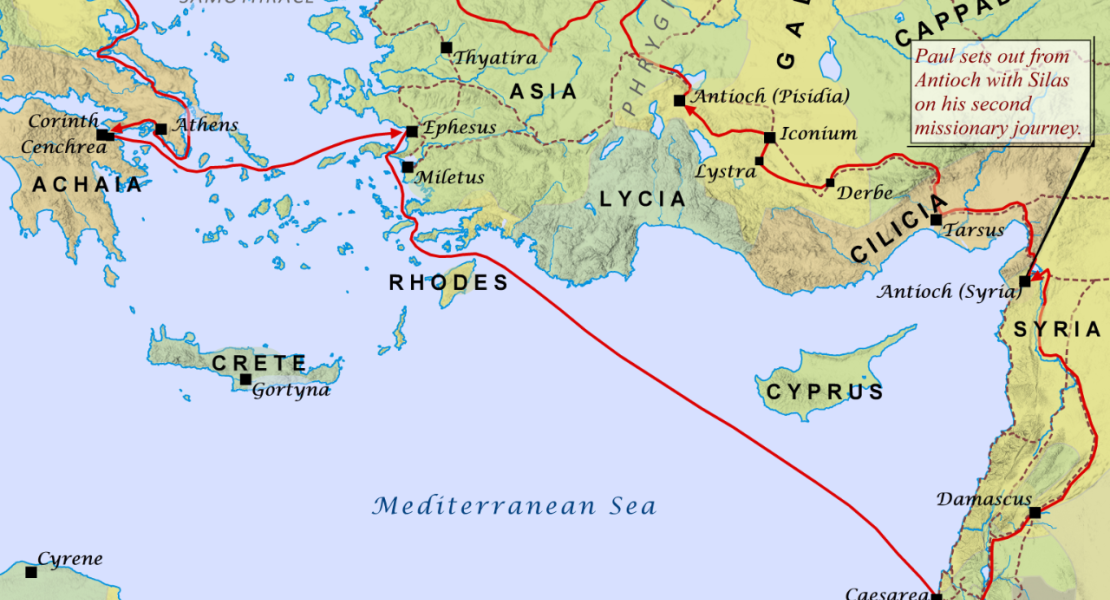By now you might be sensing a pattern in the accounts of the spread of the Gospel in Acts. The beginning of Acts 17 reveals this pattern again, and thus we see that there was a method to Paul’s work, and that he experienced both what we would think is “success” (many converts) and “failure” (being rejected and his life threatened). However, those labels are somewhat misleading. Rather than thinking in terms of success and failure, it might be more appropriate to think in terms of faithfulness; was Paul faithful to his calling from God? He was. The “results” aren’t up to him.

17:1 The travels are again pictured above; Paul and Silas are continuing on the journey that started in 15:36.
17:2-3 Again Paul starts in the Old Testament when he works among the Jews. “Scriptures” in 17:2 refers to what we know as the Old Testament, since the New Testament didn’t yet exist in the way we know it now. All of the Bible is ultimately pointing to the Christ, who is Jesus of Nazareth.
17:4 Note again Luke’s emphasis on the Greeks and women. Some Jews believed, as did some others.
17:5-9 But others, once again, not only were not convinced, but brought persecution. Jason seems to be a house church host, similar to Lydia previously.
17:6 It’s a most interesting phase that the missionaries are ones who have “turned the world upside down”. This was certainly meant in a negative sense: the rulers of the Jews have seen their world upended because their power and influence has given way to Jesus. But what a powerful witness to Jesus, however unintentional! Jesus is the One who indeed did turn the world, with all its sin, upside down.
17:10 Once more there is partnership among the church, acting together for Paul and Silas’ safety. And once more, the ministry continues with the synagogue as the starting place.
17:11 This is an often-quoted verse, for good reason. Those Jews here in Berea acted more nobly that the Thessalonians, since they didn’t simply reject the proclaimed Word, but they looked back at their own Bibles to see if what Paul was preaching was in fact true. What an example for all of us!
17:12-15 Once more Paul needs to make his escape. Though others were working with him, as the lead, Paul receives the most ire directed at him. So he escapes far away to Athens in Greece and then waits there where it’s more safe for Silas and Timothy to rejoin him.
17:16-33 This is a very well known account, and if I may venture a personal comment, one of my favourite passages of the New Testament when it comes to being wise in ministry and proclamation of the Gospel. It offers us great learning as we find ourselves more in a situation such as Paul found himself in Athens.
17:16 The city was full of idols, and it bothered Paul, as well it should have. Athena (hence the name Athens) was the most prominent Greek goddess in the area, and the Parthenon (which is today celebrated as a historical monument) was the temple for her.
17:17 Paul’s pattern of going to the synagogue continues, but there’s a bit of a different focus in this account: ministry not as much in the synagogue but in the “marketplace”.
17:18 Greece is well known as a centre of philosophy. In the time before Jesus’ birth, people like Plato and Aristotle were giants of this kind of reasoning and thinking, which continues today. Epicureans were concerned with finding pleasure in life, and the Stoics were more concerned about rational order in life and being content with one’s place in that order. But Jesus and the resurrection isn’t a way of thinking; Jesus is indeed a “foreign divinity” to those who are most concerned with the self: with this mind and thinking and reasoning.
17:19-20 The Areopagus was a place just outside of Athens (it’s often known as “Mars Hill”; Mars is the Roman god of war, called Ares in Greek, and pagos means “a fixed place” such as a hill), but it likely also described the group of people gathered there.
17:21 Maybe this rings true to us too; our culture is often concerned only with the new.
17:22-31 Paul’s speech to this council of people is striking because he doesn’t start with the Old Testament like he does in the synagogues. That would have little influence on this particular audience; though they may have been somewhat familiar with the Jewish Scriptures, they knew their own Greek culture far better. So Paul starts with that. He starts with the idols, and takes what’s there (the altar to the unknown god) and uses that to proclaim Jesus and the resurrection. He also uses other things from their own culture, specifically their poetry (verse 28). But the key is that, no matter what the starting point is, the end point is Jesus.
17:31-33 Though the starting place and method of missionary work is different according to the audience, what is consistent is the response. Some mocked Paul specifically about the resurrection, which made sense with their focus on Greek philosophy, especially that of Plato which diminished the importance of physical matter in favour of ideas. But others are intrigued and want to hear more. One of them, Dionysius, was a member of this council, and Damaris seems to be another woman of some influence.
